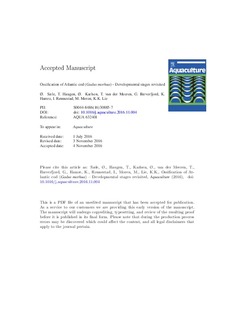Ossification of Atlantic cod (Gadus morhua) – Developmental stages revisited
Sæle, Øystein; Haugen, Trine; Karlsen, Ørjan; van der Meeren, Terje; Bæverfjord, Grete; Hamre, Kristin; Rønnestad, Ivar; Moren, Mari; Lie, Kai Kristoffer
Peer reviewed, Journal article
Accepted version
Permanent lenke
http://hdl.handle.net/11250/2483339Utgivelsesdato
2017Metadata
Vis full innførselSamlinger
- Articles [3012]
- Publikasjoner fra CRIStin [3066]
Sammendrag
In studies of marine larvae, it is common to use days post-hatch as a developmental reference point. We show that age is a poor measure of morphological and physiological development in Atlantic cod. Therefore, we propose a set of five developmental stages of Atlantic cod fromstart-feeding until the juvenile stage, based on cranial ossification as previously done in Atlantic halibut. Cod follows a sequence of cranial ossification that is to a large extent preserved in most fish species examined. These stages are therefore tools to standardize sampling and to reduce growth dependent variation in the analysis of larvae during development. Weshow that several developmental stages are present in the same rearing unit at a given time. We also demonstrate that nutrition during early development is a vital foundation for robust skeletal development. Cod larvae supplied with copepods instead of rotifers followed by Artemia, develop less skeletal deformities at 10 cm standard length, despite given the same formulated feed from 1.8 cm standard length and onwards. Statement of relevance: This paper provides developmental stages that are vital for best practice protocols in aquaculture. By relating farming practices to developmental stages and not age, the right treatment ect may be provided. This manuscript does also highlight the importance of nutrition during live feed stages on events that may occur late in the production cycle.
